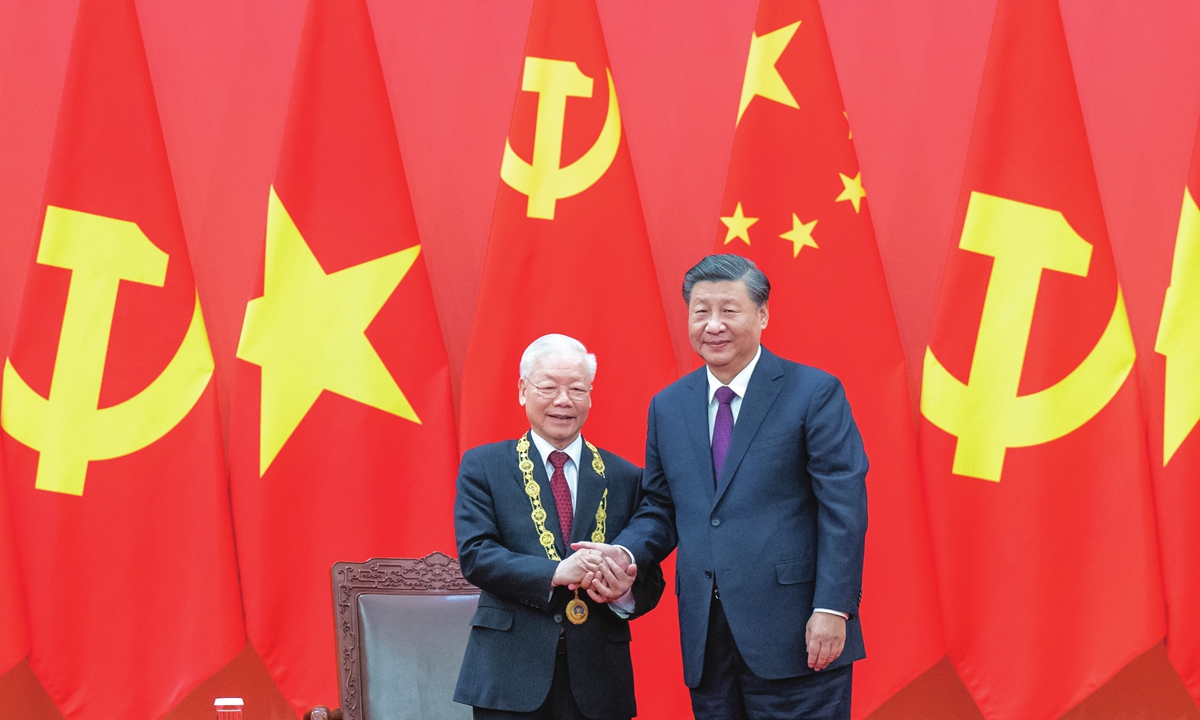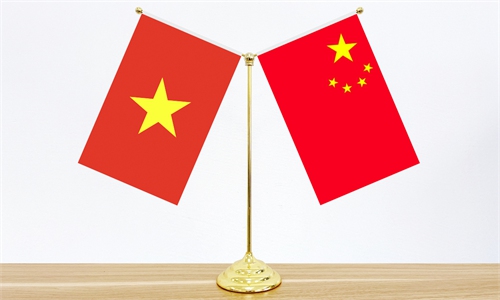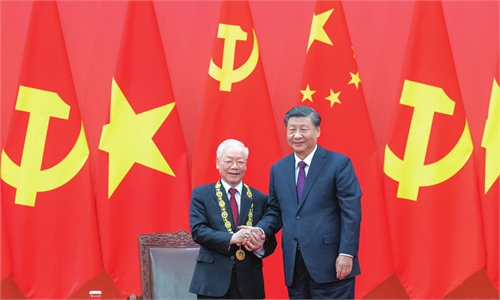China, Vietnam set key tone for bilateral ties in joint statement
Fruitful results 'highlight cooperation in unstable world, testify to the success of Nguyen's visit'

Xi Jinping, general secretary of the Communist Party of China Central Committee and Chinese president, awards Nguyen Phu Trong, general secretary of CPV Central Committee, the Friendship Medal of the People's Republic of China in Beijing, October 31, 2022 Photo: Xinhua
China and Vietnam released a joint statement on further strengthening and deepening the comprehensive strategic cooperative partnership between the two countries on Tuesday, the third day of General Secretary of the Communist Party of Vietnam Central Committee Nguyen Phu Trong's visit to China.
The joint statement underscored the two countries' commitment to developing healthy and stable bilateral relations from a strategic and long-term perspective during a period of great changes in the world, and their joint unwavering adherence to the leadership of the communist party, Chinese analysts said.
The document sets the key tone for China-Vietnam relationships amid a complex global situation and historic changes unseen in a century. The two sides frankly explored areas of disagreement and agreed to properly address them, such as maritime issues. The fruitful declaration of results testifies to the success of Nguyen's visit to China, they noted.
The world is undergoing profoundly complex and unpredictable historic changes and entering a new period of turbulent changes, the two sides noted in the joint statement. China and Vietnam will insist on viewing and developing bilateral relations from a strategic and long-term perspective and promoting the long-term healthy and stable development of the China-Vietnam comprehensive strategic cooperative partnership in the new era.
The two sides agreed to keep the mechanism of the China-Vietnam Steering Committee for Bilateral Cooperation activated and to coordinate planning and promote exchanges and cooperation between the two countries in the fields of foreign affairs, defense, security and law enforcement. The two sides will also work in cooperation to strengthen counter-terrorism and resist "peaceful evolution" and "color revolutions."
The top leaders had an in-depth and frank exchange of views on maritime issues and agreed that it is crucial to properly manage differences and maintain peace and stability in the South China Sea, and agreed to properly handle maritime issues and contribute to long-term regional security. The two sides agreed to continue to adhere to the important consensus reached by the leaders of the two countries and to seek a basic and long-term solution acceptable to both sides, according to the joint statement.
The two sides agreed to actively promote consultations on joint maritime development and consultations on the delimitation of maritime areas outside the mouth of the Beibu Gulf, and are willing to continue to actively carry out cooperation in maritime low-sensitive areas.
They agreed to continue to promote the full and effective implementation of the Declaration on the Conduct of Parties in the South China Sea, manage maritime differences, refrain from actions that complicate the situation and expand disputes, maintain peace and stability in the South China Sea, and promote maritime cooperation.
The document sets the key tone for the China-Vietnam relationship while the world is facing changes unseen in a century and overshadowed by great power competition hyped by the US. Specifically, it clarifies how China and Vietnam should enhance their development and cooperation, Ge Hongliang, director of the China-ASEAN Maritime Security Research Center at Guangxi University for Nationalities, told the Global Times on Tuesday.
The visit and the achievements following the visit indicates that the two communist parties are carrying on a tradition of communication over the governance of the country and leading bilateral ties to develop, Ge said.
The fruitful results released by the two sides demonstrate that Nguyen's visit to China was quite successful, Xu Liping, director of the Center for Southeast Asian Studies at the Chinese Academy of Social Sciences, told the Global Times on Tuesday.
"Nguyen's visit has strengthened bilateral political mutual trust and strategic communication, showing that party-to-party communication has become more and more important in China-Vietnam relations," he said.
Xu said that China-Vietnam high-level interaction and strategic communication is happening amid the situation where both China and Vietnam are socialist countries and face some divergences in the current complex international landscape.
The expert pointed out that one of the highlights in the joint statement is that the two sides have further extended and deepened political security cooperation. "For example, the two sides showed strong awareness of cooperation in defending the security of the socialist system and the ruling of the communist party," Xu said.
In the joint statement, the two sides also stressed the need to unswervingly adhere to the leadership of the communist party, to adhere to the path of socialism that is in line with the characteristics of the national conditions, to strengthen solidarity and cooperation, exchange and learn from each other, and to jointly deepen their understanding of the laws of communist party governance, socialist construction and social development.
"It sends a strong signal to the outside world - China and Vietnam have the political will to firmly uphold the direction of socialism and are capable of properly handling the divergences, which is fresh impetus for regional peace and stability," Xu said.
Since China and Vietnam normalized their relationship over 30 years ago, they forged a comprehensive strategic cooperative partnership in 2008, and the two countries have maintained communication at all levels, and have worked together to step up synergy in development strategies, facilitate practical cooperation, promote cultural and people-to-people exchanges and advance regional connectivity.
The Vietnamese side reiterated in the statement its firm commitment to the one-China principle, that it supports peaceful development of the two sides of the Taiwan Straits and the reunification of China, resolutely opposes any form of Taiwan secessionist activities and consistently supports the principle of non-interference in the internal affairs of all countries, and does not develop any official relations with Taiwan island, for which China expressed its high appreciation.


